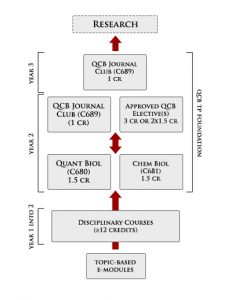 We have designed our curriculum to be value-added on a core disciplinary program of study, while satisfying the requirements of a university-approved graduate minor in Chemical and Physical Biology (CPB). This allows us to support prospective trainees in their second and third years of graduate school, after completing many of their core disciplinary requirements in one of five departments or programs, from which they earn the Ph.D. These include biochemistry, biology, cell, molecular and cancer biology (CMCB), chemistry, and neuroscience. The QCB training program is schematized in the figure right and is managed by the Curriculum Committee.
We have designed our curriculum to be value-added on a core disciplinary program of study, while satisfying the requirements of a university-approved graduate minor in Chemical and Physical Biology (CPB). This allows us to support prospective trainees in their second and third years of graduate school, after completing many of their core disciplinary requirements in one of five departments or programs, from which they earn the Ph.D. These include biochemistry, biology, cell, molecular and cancer biology (CMCB), chemistry, and neuroscience. The QCB training program is schematized in the figure right and is managed by the Curriculum Committee.
Dissertation Research
Develop a research project that is tailored to your interests and features some aspect of broad, interdisciplinary training.
Introduction to Quantitative Biology and Measurement (CHEM C680)
This course is an introduction to important concepts, techniques and methods in structural biology and biophysical chemistry that are used to explore the physical-biology interface and is taught by Prof. Giedroc
Introduction to Chemical Biology I (CHEM C681)
This course serves as the foundation to concepts and approaches at the chemistry-biology interface and is taught by Prof. VanNieuwenhze in the Fall of every year.
QCB Journal Club (CHEM C689)
Students are partnered with a small subset of QCB trainers to lead the discussion of a paper or papers at the forefront or research in Quantitative and Chemical Biology. This course now meets in the Spring semester of every year, and must be taken twice by trainees, in the both years of fellowship support.
QCB Electives
Round out your QCB training experience with a university-approved minor in Chemical and Physical Biology (CPB) by earning 3 cr from a wide selection of 1.5- and 3-cr elective courses to suit your research interests.


